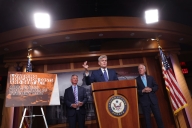You have /5 articles left.
Sign up for a free account or log in.
International higher education groups are lobbying for changes to a new veterans’ education law, the THRIVE Act, that they say could dissuade colleges from using commissioned agents in international student recruiting out of fear of losing access to GI Bill benefits.
As NAFSA: Association of International Educators explained in an analysis published last week, the law, signed in June, “instructs the State agencies that approve courses of study for GI Bill purposes to take action that could include not approving a school's new programs of study or disapproving previously-approved programs of study” if the agencies determine that the institution, or an entity it contracts with, engages in incentive-based student recruitment.
The Higher Education Act also includes a prohibition on incentive-based compensation in student recruiting, but it includes a carve-out for recruiting students internationally. The use of commissioned agents in international recruiting is a still-controversial but growing practice. A recent joint survey by the American International Recruitment Council (AIRC) and the National Association for College Admission Counseling (NACAC) found that 49 percent of the 294 institutions surveyed partner with agents for international undergraduate student recruitment.
AIRC, which represents colleges and recruitment agencies, is encouraging its members to advocate for a technical amendment to align the language in the THRIVE Act with the language included in the Higher Education Act. Brian Whalen, AIRC's executive director, said that while consequences of the law for international recruitment may have been unintended, “we have to work aggressively to make sure there is a technical correction to this law and we hope that will happen in the next few months.”
Jill Allen Murray, deputy executive director for public policy for NAFSA, said it remains unclear how the Department of Veterans Affairs will implement the policy. "We would appreciate the VA providing greater flexibility to institutions given the widespread implications of this policy," she said. "We are hopeful that Congress will remedy the situation soon and will continue to work in coalition with higher education associations and with the Hill to encourage them to do so."
Spokespeople for the House Committee on Veterans’ Affairs and the chair of the Senate Veterans’ Affairs committee, U.S. Senator Jon Tester of Montana, did not reply to emailed requests for comment on Friday.




